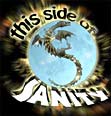This is a grassroots effort to have a law protecting the religious rights of Witches in all 50 U.S. states plus at the U.S. federal level. This proposed law would also grant the same rights to members of any religion.
For success, it is necessary to build up interest and support not just among Witches, but also among clergy of other religions and among the general public as a whole.
More will be posted on this web page, including how other teen Witches around the nation have had local successes.
The first step is coming up with a really good law. The following proposed text for a Witch’s Right Law is just a draft copy and needs refinement before it is ready to be submitted to state legislatures and Congress.
proposed text — draft version
SECTION 1. SHORT TITLE
This Act may be cited as the ‘Witch’s Rights Act’.
SECTION 2. DECLARATION OF PURPOSE
The long standing practice of Witch Hunts and Witch Trials shall come to an end and the human rights of Witches shall be protected.
SECTION 3.
(a) Provisions of this Act that apply to Witches as clergy apply equally to the clergy of all religions.
(b) Provisions of this Act that apply to Witches as members of Witchcraft religion apply equally to the members of all religions.
(c) Provisions of this Act that apply to Covens, Circles, Witch or Religious Houses, Temples, or other Witch assembly or institution apply equally to all churches, religious assemblies, or religious institutions.
(d) Teenaage Witches (and teenagers of all religions) who believe that their religious rights have been violated may submit an essay at no fee to the court. A law clerk or paralegal will be assigned to review the essay. If a judge agrees that there might be merit to the case, the judge will appoint an attorney for the teenager. Submission or rejection of an essay does nto preclude a teenager from subsequently using normal procedure.
SECTION 4. PROHIBITION OF CERTAIN CRIME ACTS
(a) Acts of physical violence against Witches are outlawed, including but not limited to beatings, whippings, sexual assault, rape, gang rape, sexual mutilation, torture, and killing.
(b) All Witches (and members of all religions) have the right to be free from any violence, or intimidation by threat of violence, committed against their persons or property because of being a Witch (and members of all religions) or because they are perceived to be a Witch (and members of all religions).
(c) Whoever, whether or not acting under color of law, willfuly causes bodily injury or attempts to cause bodily injury to any Witch or any person perceived to be a Witch (or any person because of the actual or perceived religion of that person) shall be imprisoned not more than 10 years, fined in accordance with this Act, or both.
(d) Whoever, whether or not acting under color of law, willfuly causes bodily injury or attempts to cause bodily injury to any Witch or any person perceived to be a Witch (or any person because of the actual or perceived religion of that person) shall be imprisoned for any term of years or for life, fined in accordance with this Act, or both, if death results from the offense or the offense involves aggravated sexual abuse or an attempt to commit aggravated sexual abuse, torture or an attempt to commit torture, or an attempt to kill.
(e) Mere possession or printing of the Torah, Tanach, Bible, Koran, or any other ancient religious text that calls for violence against Witches shall not be illegal. Members of all religions have the right to criticize or even comdemn Witchcraft (and all religions) as long as the speech, sermon, writing, or other exprression does not rise to the level of advocacy of violence.
SECTION 5. FREE EXERCISE OF RELIGION PROTECTED
(a) Witches are free to practice Witchcraft. The remainder of this section is not an exhaustive list of protected Witchcraft practices.
(b) Witches (and the clergy of all religions according to the customs and doctrine of each religion) are free to perform weddings, processions, circles, holy days, Sabbats, Esbats, ceremonies, celebrations, fire jumpings, commitments, handfastings, handpartings, renewals, annulments, separations, divorces, funerals, natural healing artistry, blessings, namings, welcomings, baptisms, comings of age, rites of passage, affirmations, dedications, readings, and/or other rituals.
(c) Witches (and members of all religions) are free to perform divination, including but not limited to astrology, numerology, tarot, and I Ching.
(d) Witches (and members of all religions) are free to cast spells, incantations, invocations, and other magick.
(e) Witches (and members of all religions) are free to create and use magick tools. Schools, prisons, and other institutions may place reasonable restrictions essential for safety and security on wands, staves, athames, knifes, swords, and other magick tools that can reasonably be employed as a weapon.
(f) Witches (and members of all religions) are free to grow, use, and possess any plants.
(g) Witches (and clergy of all religions) are free to create, possess, use, and distribute any herbal preparation for religious and magick purposes. Witches (and members of all religions) are free to create, possess, and use any herbal preparation.
(h) Witches (and members of all religions) are free to make and burn candles and incenses.
(i) Witches (and members of all religions) are free to perform Witchcraft ritual skyclad or in ceremonial clothing.
(j) Witches (and members of all religions) are free to wear or display Witchcraft and magick (or other religious) symbols, except in cases where there is a genuine safety hazard equally applied to all jewelry.
(k) Witches (and members of all religions) are free to assemble in Covens, Circles, Witch or Religious Houses, Temples, or other Witch assembly or institution. Covens, Circles, Witch or Religious Houses, Temples, or other Witch assembly or institution, as well as Churches and religious assembly or institution of all religions, are exempt from direct taxation for Witchcraft, religious, charitable, educational, scientific, or literary purposes.
(l) Witches (and members of all religions) are free to engage in any Witchcraft practice that does no harm.
(m) Government shall not substantially burden a Witch’s (and members of all relgiions) exercise of Witchcraft (or exercise of religion) even if the burden results from a rule of general applicability except that the government may substanatially burden a Witch’s (and members of all relgiions) exercise of Witchcraft (or exercise of religion) only if it demonstrates that application of the burden to that person is in furtherance of a compelling government interest and is the least restrictive means of furthering that compelling governmental interest.
(n) The term ‘exercise of Witchcraft’ includes any exercise of Witchcraft, whether or not compelled by, or central to, a system of Witchcraft. The term ‘religious exercise’ includes any exercise of religion, whether or not compelled by, or central to, a system of religious belief. In determining whether an act or refusal to act is substantially motivated by sincere religious belief under this Act, it is not necessary to determine that the act or refusal to act is motivated by a central part or central requirement of the Witch’s (and members of all religions) sincere religious belief.
SECTION 6. MARRIAGE
(a) Witches (and clergy of all religions according to the customs and doctrine of each religion) may perform marriages and handfastings of any consenting adults. Handfastings last for a year and a day. No clergy of any religion shall be required to perform any marriage that violates the customs or doctrine of that religion.
(b) Witches (and clergy of all religions according to the customs and doctrine of each religion) may perform annulments, divorces, and handpartings.
(c) Divorce decrees and child custody decrees may not include restrictions on Witches practicing Witchcraft.
SECTION 7. DISCRIMINATORY PRACTICES PROHIBITED
(a) Witches (and members of all religions) shall be entitled to the full and equal enjoyment of the accomodations, goods, services, facilities, privileges, advantages, and services of any place of public accomodation and all business establishments of every kind whatsoever.
(b) Witches (and members of all religions) shall not be discriminated against in employment, education, medical care, or housing.
(c) No business establishment of any kind whatsoever shall discriminate against, boycott or blacklist, or refuse to buy from, contract with, sell to, or trade with any Witch (and members of all religions) because of the religion of the person or of the person’s partners, members, stockholders, directors, officers, managers, superintendents, agents, employees, business associates, suppliers, or customers, because the person is perceived to be a Witch (or member of any religion),or because the person is associated with a person who has, or is perceived to be, a Witch (or member of any religion).
(d) As used in this section,“person” includes any person, firm, association, organization, partnership, business trust, corporation, limited liability company, or company.
SECTION 8. LAND USE
(a) No government shall impose or implement a land use regulation in a manner that imposes a substantial burden on the religious exercise of a Witch (and members of all religions), including a Coven, Circles, Witch or religious house, Temple, or a religious assembly or institution, unless the government demonstrates that imposition of the burden on that person, coven, circle, Witch or religious house, temple, assembly, or institution is in furtherance of a compelling government interest and is the least restrictive means of furthering that compelling governmental interest.
(b) No government shall impose or implement a land use regulation in a manner that treats a coven, circle, Witch or religious house, temple, or religious assembly or institution on less than equal terms with a nonreligious assembly or institution.
(c) No government shall impose or implement a land use regulation that discriminates against any coven, circle, Witch or religious house, temple, or assembly or institution on the basis of religion or religious denomination.
(d) No government shall impose or implement a land use regulation that totally excludes religious assemblies from a jurisdiction; or unreasonably limits covens, circles, Witch or religious houses, temples, religious assemblies, institutions, or structures within a jurisdiction.
SECTION 9. INSTITUTIONALIZED PERSONS
No government shall impose a substantial burden on the religious exercise of a person residing in or confined to an institution, even if the burden results from a rule of general applicability, unless the government demonstrates that imposition of the burden on that person is in furtherance of a compelling governmental interest; and is the least restrictive means of furthering that compelling governmental interest.
SECTION 10. CRIMINAL ACTION
(a) Witches (and members of all religions) whose religious exercise has been burdened in violation of this Act may assert a claim or defense in a judicial proceeding and obtain appropriate relief against a government.
(b) Courts may not employ traditional ordeals for testing Witches, including but not limited to torture, swimming, witches’ chair, bootes, pressing, pricking for the Devil’s mark, or crushing bones.
(c) Religious biases against Witches (or members of any other religion) of law enforcement officials and prosecutors must be revealed to juries in criminal cases.
(d) No member of a religion that advocates or has advocated death or serious physical harm to Witches or that has a history of violence against Witches or that is hostile or has a history of being hostile towards Witchcraft may be a Trail Judge in a case with a Witch defendant.
(e) While no religion can be a bar to serving on a jury, potential jurors may be questioned about their ability to be fair in cases involving a Witch.
(f) Government is not required to prove that the remedy and penalty provisions of the law, ordinance, rule, order, decision, practice, or other exercise of governmental authority that imposes the substantial burden are the least restrictive means to ensure compliance or to punish the failure to comply.
SECTION 11. CIVIL ACTION
(a) Witches (and members of all religions) may initiate a civil action for preventive relief, including an application for a permanent or temporary injunction, restraining order, or other order, and upon timely applcation, the court may, in its discretion, permit the Attorney General to intervene in such civil action if he or she certifies that the case is of general public importance.
(b) Upon application by the complainant and in such cicrumstances as the court may deem just, the court may appoint an attorney for such complainant and may authorize the commencement of the civil action without the payment of fees, costs, or security.
(c) If a Witch (and members of all religions) produces prima facie evidence to support a claim alleging a violation of this Act by the government, the government shall bear the burden of persuasion on whether the law (including a regulation) or government practice that is challenged by the claim substantially burdens the Witch’s (and members of all religions) exercise of Witchcraft (and religion).
(d) In an action brought by a complaining party under this Act, the complaining party may recover compensatory and punitive damages, in addition to any relief authorized under this Act, from the respondent. In no case shall compensatory damages be less then one thousand dollars ($1,000) for each and every offense. A complaining party may recover punitive damages under this section against a respondent if the complaining party demonstrates beyond a reasonable doubt that the respondent acted with malice or with reckless indifference to the protected rights of an aggrieved individual.
(e) If a complaining party seeks compensatory or punitive damages under this section, any party may demand a trial by jury.
(f) In any civil action commenced pursuant to this Act, the court, in its discretion, may allow the prevailing party a reasonable attorney’s fee and other reasonable expenses incurred in bringing the action as part of the costs. In awarding an attorney’s fee the court, in its discretion, may include expert fees as part of the attorney’s fee.
(g) Whenever the Attorney General has reasonable cause to believe that any person or group of persons is engaged in a paattern or practice of resistance to the full enjoyment of any of the rights secured by this Act, and the the pattern or practice is of such a nature and is intended to deny the full exercise of the rights herein described, the Attorney General may bring a civil action in the appropriate district court of the United States by filing with it a complaint (1) signed by him or her (or in his or her absence the Acting Attorney General), (2) setting forth facts pertaining to such pattern or practice, and (3) requesting such preventive relief, including an application for a permanent or temporary injunction, restraining order or other order against the person or persons responsible for such pattern or practice, as he deems necessary to insure the full enjoyment of the rights herein described.
(h) The courts shall have jurisdiction of proceedings instituted pursuant to this Act and shall exercise the same without regard to whether the aggrieved party shall have exhausted any administrative or other remedies that may be provided by law.
(i) Witches (and members of all religions) whose religious exercise has been burdened in violation of this Act may assert a claim or defense in a judicial or administrative proceeding without regard to whether the proceeding is brought in the name of the government, the people, or by any other person.
SECTION 12. SEVERABILITY
If any provision of this Act is held to be unconstitutional, the remainder of this Act and the application of the provisions of such to any person or circumstance shall not be affected thereby.
SECTION 13. RULES OF CONSTRUCTION
(a) This Act shall be construed in favor of a broad protection of religious exercise, to the maximum extent permitted by the terms of this Act and the Constitution.
(b) Nothing in this Act shall be construed to prohibit any expressive conduct protected from legal prohibition by, or any activities protected by the free speech or free exercise clauses of, the First Amendment to the Constitution.
(c) Nothing in this Act shall be construed to affect, interpret, or in any way address that portion of the First Amendment prohibiting laws respecting the establishment of religion (referred to in this section as the ‘Establishment Clause’).
(d) This Act applies to all law, and the implementation of that law, whether statutory or otherwise, and whether adopted before or after the enactment of this Act.
(e) Statutory law adopted after the date of the enactment of this Act is subject to this Act unless such law explicitly excludes such application by reference to this Act.
(f) Nothing in this Act shall be construed to authorize any government to burden any religious belief.
(g) This Act does not establish or eliminate a defense to a civil action or criminal prosecution under a civil rights law.
(g) A government may avoid the preemptive force of any provision of this Act by changing the policy or practice that results in a substantial burden on religious exercise, by retaining the policy or practice and exempting the substantially burdened religious exercise, by providing exemptions from the policy or practice for applications that substantially burden religious exercise, or by any other means that eliminates the substantial burden.
(h) Nothing in this Act shall be construed to preempt law that is equally protective of religious exercise as, or more protective of religious exercise than, this Act.













